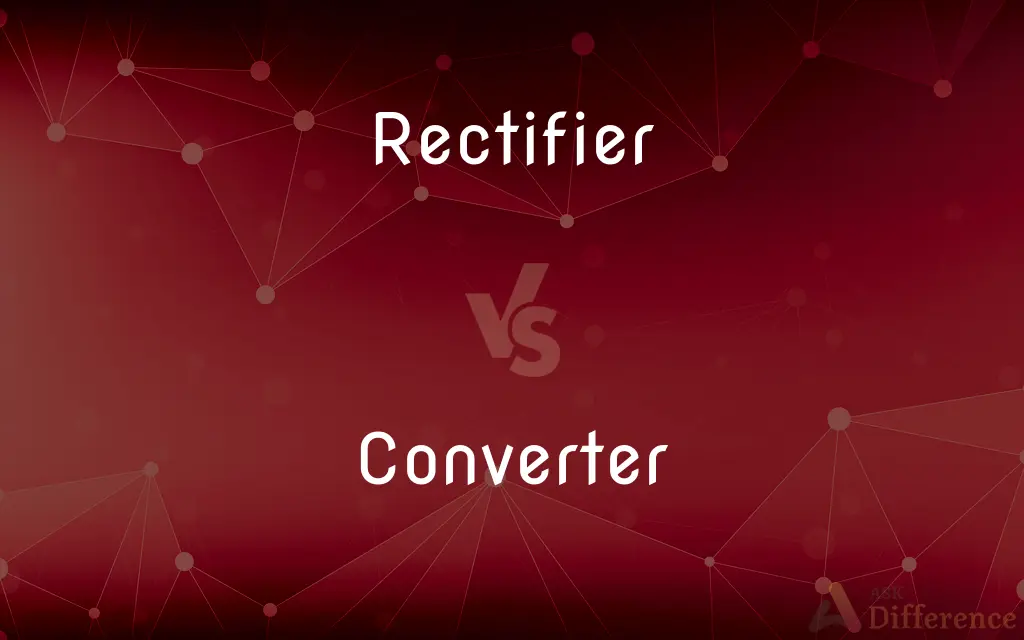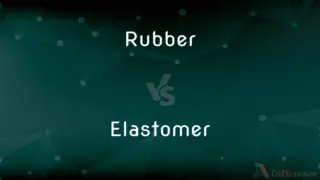Rectifier vs. Converter — What's the Difference?
By Urooj Arif & Fiza Rafique — Updated on March 8, 2024
A rectifier converts AC to DC, focusing on power conversion; a converter varies electrical energy form, including AC to DC, DC to AC.

Difference Between Rectifier and Converter
Table of Contents
ADVERTISEMENT
Key Differences
Rectifiers specialize in converting alternating current (AC) to direct current (DC), primarily used in power supply applications. They are essential for devices that require a steady DC output for their operation. On the other hand, converters are more versatile, capable of not only transforming AC to DC but also DC to AC, and even changing the voltage level of DC.
Rectifiers are often seen in charging circuits, power supply units, and electronic devices that require a constant DC input. These devices utilize diodes to ensure current flows in a single direction, turning AC into usable DC. Whereas converters, such as inverters and DC-DC converters, are used in a broader range of applications, including renewable energy systems, electric vehicles, and electronic devices that need different forms or levels of electrical energy.
The efficiency of rectifiers is generally high, especially in systems designed for minimal energy loss during the conversion process. They are optimized for a specific task, which allows for streamlined design considerations. Converters, due to their versatile nature, might have varying efficiency levels based on the complexity of the conversion process and the technology used.
Rectifiers typically form the basis of power supplies, providing a fundamental conversion that is often a preliminary step in electrical systems. They are crucial in establishing a stable DC environment for various electronics. Converters extend this utility by offering adjustments in power characteristics to meet specific needs, like changing power levels or converting back to AC for devices like motors.
In terms of design complexity, rectifiers are generally simpler, as their primary goal is to achieve a single directional flow of current. This simplicity often leads to cost-effectiveness in manufacturing and maintenance. Converters, due to their broader capabilities, may involve more complex designs and components, which can affect cost and maintenance considerations.
ADVERTISEMENT
Comparison Chart
Function
Converts AC to DC only
Converts AC to DC, DC to AC, changes voltage levels
Primary Use
Power supplies, electronic devices
Renewable energy systems, electric vehicles
Efficiency
Generally high
Varies, depending on conversion process
Design
Simpler, focused on unidirectional current flow
More complex, handles various conversion processes
Cost
Generally lower due to simpler design
Can be higher due to complexity
Compare with Definitions
Rectifier
Can be made from diodes or silicon-controlled rectifiers (SCRs).
The bridge rectifier circuit uses four diodes to efficiently convert AC to DC.
Converter
Facilitates efficient energy conversion in electric vehicles.
Electric cars use converters to manage battery power and operate the motor.
Rectifier
Essential for providing stable DC output.
LED lighting systems rely on rectifiers to ensure a constant DC supply.
Converter
Enables the use of renewable energy by converting DC to AC.
Solar panels use converters to feed electricity into the grid.
Rectifier
A device that converts alternating current (AC) to direct current (DC).
The power adapter for your laptop uses a rectifier to provide DC power.
Converter
A device capable of changing the form of electrical energy.
An inverter is a type of converter that changes DC into AC for home solar power systems.
Rectifier
Integral in charging circuits for batteries.
Your smartphone charger includes a rectifier to safely charge the battery.
Converter
Used to adjust voltage levels in electronic circuits.
A buck converter reduces voltage from a higher DC input to a lower DC output.
Rectifier
Used in power supply units for electronic devices.
The desktop computer's power unit contains a rectifier to convert incoming AC to DC.
Converter
Can convert DC to DC at different voltage levels.
Laptop power adapters often contain converters to adjust the voltage to the required level.
Rectifier
A rectifier is an electrical device that converts alternating current (AC), which periodically reverses direction, to direct current (DC), which flows in only one direction. The reverse operation is performed by the inverter.
Converter
A furnace in which pig iron is converted into steel by the Bessemer process.
Rectifier
An electrical device which converts an alternating current into a direct one by allowing a current to flow through it in one direction only.
Converter
A machine that converts electric current from one kind to another.
Rectifier
One that rectifies
A rectifier of many wrongs.
Converter
An electronic device that converts one frequency of a radio signal to another.
Rectifier
(Electronics) A device, such as a diode, that converts alternating current to direct current.
Converter
A device that converts data from one code to another.
Rectifier
A worker who blends or dilutes whiskey or other alcoholic beverages.
Converter
One that is employed in converting raw products into finished products.
Rectifier
Something that rectifies.
Converter
A person or thing that converts.
Rectifier
A device that converts alternating current into direct current; often a diode.
Converter
(electrical engineering) A device that changes voltage or frequency, for example one that converts alternating current to direct current.
Rectifier
(nautical) An instrument used for determining and rectifying the variations of the compass on board ship.
Converter
(metallurgy) A retort or furnace, used e.g. in the Bessemer process, in which molten cast iron is decarburized and converted into steel by a blast of air forced through the liquid metal.
Rectifier
(artificial neural networks) The activation function , where x is the input to a neuron.
Converter
A reaction chamber in which exhaust gases are catalytically converted to carbon dioxide
Rectifier
One who, or that which, rectifies.
Converter
(computing) A program that converts one file format to another one, or which converts between different units of measurement, such as miles to meters.
Unit convertor
Rectifier
Specifically: (a) (Naut.) An instrument used for determining and rectifying the variations of the compass on board ship. (b) (Chem.) A rectificator.
Converter
(medicine) A patient with a certain condition that subsequently develops into another condition.
Rectifier
Electrical device that transforms alternating into direct current
Converter
A device that converts an analogue to a digital signal, or vice versa.
Rectifier
A person who corrects or sets right;
A rectifier of prejudices
Converter
One who converts; one who makes converts.
Converter
A retort, used in the Bessemer process, in which molten cast iron is decarburized and converted into steel by a blast of air forced through the liquid metal.
Converter
A device for changing one substance or form or state into another
Common Curiosities
Can a rectifier convert DC to AC?
No, a rectifier cannot convert DC to AC; it only converts AC to DC.
How does a converter differ from a rectifier?
A converter can change electrical energy from AC to DC or DC to AC, and adjust voltage levels, while a rectifier only converts AC to DC.
What does a rectifier do?
A rectifier converts alternating current (AC) to direct current (DC) for use in electronic devices and power supplies.
How efficient are rectifiers?
Rectifiers are generally highly efficient as they are designed for minimal energy loss during the conversion from AC to DC.
Do converters affect the quality of electricity?
Converters can affect electricity quality, but modern designs aim to minimize issues like harmonic distortion for a clean power output.
Why is a converter important in renewable energy systems?
Converters enable the conversion of DC from solar panels or wind turbines to AC, which can be used in homes or fed into the power grid.
Can a converter change the voltage level of DC electricity?
Yes, converters can change the voltage level of DC electricity to either increase or decrease it as needed.
What components are commonly used in rectifiers?
Rectifiers commonly use diodes or silicon-controlled rectifiers (SCRs) to allow current to flow in one direction.
Do all electronic devices use rectifiers?
Many electronic devices that plug into an AC source use rectifiers to convert the power to DC, but not all devices require them.
Where are rectifiers used?
Rectifiers are used in power supply units, electronic devices, and battery charging circuits.
What are the types of converters?
Converters include AC to DC rectifiers, DC to AC inverters, and DC to DC converters that adjust voltage levels.
Are converters used in electric vehicles?
Yes, converters are used in electric vehicles to manage battery power and operate electric motors efficiently.
Is a rectifier a type of converter?
Yes, a rectifier is a specific type of converter that changes AC to DC.
Are converters more expensive than rectifiers?
Converters can be more expensive than rectifiers due to their complexity and the broader range of functions they perform.
How do converters contribute to energy efficiency?
Converters can contribute to energy efficiency by optimizing the form and level of electrical energy to match the specific needs of a system, minimizing waste.
Share Your Discovery

Previous Comparison
Rubber vs. Elastomer
Next Comparison
Leaf vs. LeafletAuthor Spotlight
Written by
Urooj ArifUrooj is a skilled content writer at Ask Difference, known for her exceptional ability to simplify complex topics into engaging and informative content. With a passion for research and a flair for clear, concise writing, she consistently delivers articles that resonate with our diverse audience.
Co-written by
Fiza RafiqueFiza Rafique is a skilled content writer at AskDifference.com, where she meticulously refines and enhances written pieces. Drawing from her vast editorial expertise, Fiza ensures clarity, accuracy, and precision in every article. Passionate about language, she continually seeks to elevate the quality of content for readers worldwide.















































